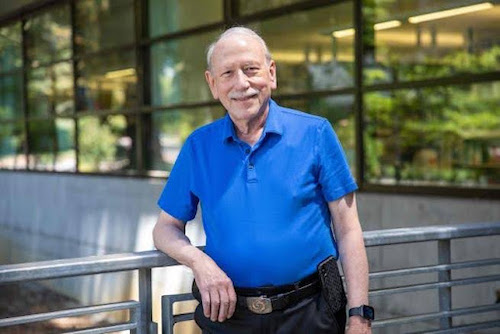Campus News
UC Santa Cruz Physicist Joel Primack wins 2024 AAAS Abelson Prize
The American Association for the Advancement of Science (AAAS) has awarded the prestigious 2024 Philip Hauge Abelson Prize to Joel R. Primack, distinguished professor of physics emeritus at the University of California, Santa Cruz and a key architect of the Cold Dark Matter theory.

The American Association for the Advancement of Science (AAAS) has awarded the prestigious 2024 Philip Hauge Abelson Prize to Joel R. Primack, distinguished professor of physics emeritus at the University of California, Santa Cruz and a key architect of the Cold Dark Matter theory. The honor celebrates his extraordinary career, notably his pioneering work at UC Santa Cruz, where he played a pivotal role in shaping the field of astrophysics.
“Joel Primack’s long-lasting and extraordinary contributions have helped not only to advance scientific knowledge but also to create opportunities for scientists to become involved in public affairs,” said Dean of Physical and Biological Sciences Bryan Gaensler. “Joel has dedicated his career to strengthening science-informed decision-making, protecting human rights, advancing arms control, and promoting ethics that emphasize the responsibility of humanity to protect our planet.”
UC Santa Cruz legacy
Primack’s journey at UC Santa Cruz began in 1973. In the early 1980s he emerged as one of the main architects of the modern theory of the universe, Cold Dark Matter. His research has provided profound insights into the formation and distribution of galaxies, revolutionizing our comprehension of the large-scale Universe.
For example, although our own galaxy, the Milky Way, and many other nearby galaxies are disk-shaped, by comparing Hubble and Webb Space Telescope images with their supercomputer simulations, Primack and his colleagues recently discovered that most galaxies start out pickle-shaped because of the filamentary distribution of dark matter in the early universe.
A fellow of the American Physical Society (APS), AAAS, and California Academy of Sciences, Primack continues to be very active in research, supervising graduate students and senior thesis students, and helping lead several international collaborations and scientific organizations. He has hosted the annual Santa Cruz Galaxy Workshop for many years, and he organized and directed the UC High-Performance AstroComputing Center from 2010 to 2015.
Astrophysics and beyond
In an era where science intersects with policy and public engagement, Joel Primack stands out for his diverse contributions. He played a pivotal role in establishing the AAAS Science and Technology Policy Fellowship program, which has empowered thousands of scientists to contribute to policy-making, creating a lasting impact on both individuals and the broader field of science policy.
Primack has also mentored numerous students, many of whom have ventured into big tech and science policy. He underscores the importance of understanding one’s strengths and preferences early in a scientific career, and recognizing when a problem is ripe for solution.
In 1988, Primack led the Federation of American Scientists program on space nuclear reactor arms control and helped stop the launching of Soviet reactor-powered satellites. In 2004, as a member of the APS Panel on Public Affairs, he organized and chaired the committee that wrote a critical APS report on President Bush’s Vision for Space Exploration.
Primack also started the program on Science and Human Rights at AAAS. In 1995, he was made a Fellow of the AAAS “for pioneering efforts in the establishment of the AAAS Congressional Science Fellows Program and for dedication to expanding the use of science in policy-making throughout government.” He chaired the AAAS Committee on Science, Ethics, and Religion from 2000 to 2002. He also co-authored a book about the relationship between science and government, and two books about the meaning of the new cosmology.
Personal triumphs and ongoing contributions
Beyond the realm of astrophysics, Primack’s personal journey adds a touch of inspiration. Overcoming a life-threatening battle with pancreatic cancer through pioneering immunotherapy, he not only survived but thrived. His commitment to science, public policy, and the pursuit of knowledge remains unwavering.
Joel Primack’s life, marked by groundbreaking scientific discoveries and a steadfast commitment to the betterment of science and society, stands as a testament to the enduring impact that a scientist can have on the world.
Upcoming discoveries
Even in the midst of accolades and a long list of accomplishments, Joel Primack continues to push the boundaries of knowledge. His recent focus on comparing galaxy simulations by the leading computer simulation codes of teams around the world through the international AGORA collaboration, and groundbreaking discoveries challenging the conventional view of galaxy clustering signal an exciting chapter ahead. Primack is also finishing a review of Galaxy Formation for the 2024 Annual Review of Nuclear and Particle Science.
Looking ahead, Primack remains committed to advancing scientific knowledge and leveraging it for the betterment of society. His tireless advocacy for evidence-based decision-making and his unwavering dedication to expanding the role of scientists in policy discourse serve as a beacon of inspiration for future generations. In response to his recognition, Primack remains optimistic about the future. He reflects on the evolving landscape of science, offering insights into the collaborative nature of scientific work, the importance of adapting to emerging data, and the continuous pursuit of understanding the unknown.
“As a young scientist, I was often advised that spending time on social and political issues would be career suicide, and that I should focus solely on research,” Primack said. “But I take seriously the social responsibility of scientists and I deeply appreciate being recognized both for my scientific contributions and for my efforts to broaden the opportunities for scientists and scientific societies to help solve the challenges facing our world.”
The 2024 AAAS Abelson Prize not only celebrates a lifetime of achievements but also acknowledges Joel Primack’s indelible mark on astrophysics, science policy, and the enduring spirit of scientific inquiry.
For more details on Joel Primack’s remarkable journey and contributions, visit the AAAS Abelson Prize announcement and Primack’s website.